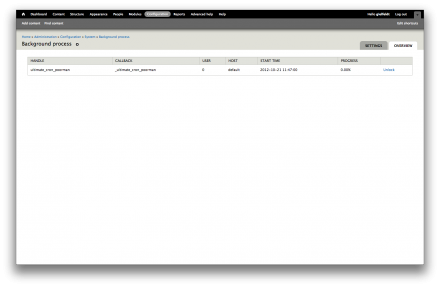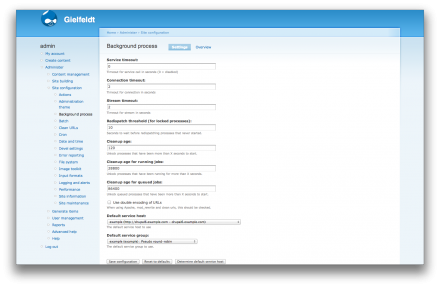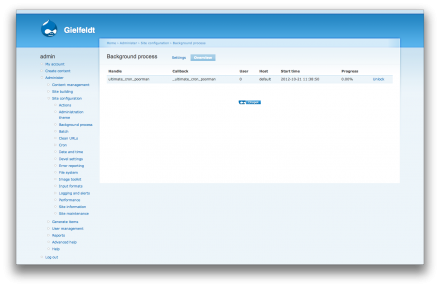 Support for Drupal 7 is ending on 5 January 2025—it’s time to migrate to Drupal 10! Learn about the many benefits of Drupal 10 and find migration tools in our resource center.
Support for Drupal 7 is ending on 5 January 2025—it’s time to migrate to Drupal 10! Learn about the many benefits of Drupal 10 and find migration tools in our resource center.Dependencies
Modules that utilize Background Process
Developer
Executing a background process
<?php
$handle = background_process_start('mymodule_dosomething', $myvar1, $myvar2);
$handle = background_process_start(array('myclass', 'mystaticfunction'), $myvar1, $myvar2);
$handle = background_process_start(array($myobject, 'mymethod'), $myvar1, $myvar2);
$handle = background_process_start_locked('dontrunconcurrently', 'mymodule_dosomething', $myvar1, $myvar2);
?>
Executing arbitrary http requests
The following code shows how to fetch data via http in "parallel" (asynchronous non-blocking mode)
It uses an API similar to that of HTTPRL but "slightly" different, in order for the caller to gain more control of the requests. Plans to join forces with HTTPRL are in place.
Drupal way: blocking/synchronous
<?php
$r = array();
for ($i = 0; $i < 10; $i++) {
$r[] = drupal_http_request('http://www.example.com/stuff/' . $i);
}
print_r($r);
?>
Background process way: non-blocking/a-synchronous (limited to 5 concurrent connections)
<?php
$r = array();
for ($i = 0; $i < 10; $i++) {
$r[] = background_process_http_request('http://www.example.com/stuff/' . $i, array('postpone' => TRUE));
}
background_process_http_request_process($r, array('limit' => 5));
print_r($r);
?>
Background process way: non-blocking/a-synchronous with callback (limited to 5 concurrent connections)
<?php
function mycallback($result) {
// Do something with $result
}
$r = array();
for ($i = 0; $i < 10; $i++) {
$r[] = background_process_http_request('http://www.example.com/stuff/' . $i, array('postpone' => TRUE, 'callback' => 'mycallback'));
}
background_process_http_request_process($r, array('limit' => 5));
print_r($r);
?>
Pool management
In multiserver environments, it is possible to delegate requests to specific hosts by declaring service groups and service hosts in the settings file.
Example
<?php
$conf['background_process_service_hosts'] = array(
'ultimate_cron_poorman' => array(
'base_url' => 'http://192.168.1.100',
'http_host' => 'mysite.example.com',
),
'www1' => array(
'base_url' => 'http://my-username:my-password@192.168.1.101',
'http_host' => 'mysite.example.com',
),
'www2' => array(
'base_url' => 'http://192.168.1.102',
'http_host' => 'mysite.example.com',
),
// Apache server status declaration for www1
'www1_ass' => array(
'base_url' => 'http://192.168.1.101/server-status',
'http_host' => '192.168.1.101',
),
);
$conf['background_process_service_groups'] = array(
'default' => array(
'hosts' => array('ultimate_cron_poorman', 'www1', 'www2'),
),
'cron' => array(
'hosts' => array('ultimate_cron_poorman'),
),
'services' => array(
'hosts' => array('www1', 'www2'),
),
);
?>
Default service host
If a process is started using a service host which is not defined, the service host "default" will be used. If "default" is not defined in the "background_process_service_hosts" variable, Background Process will fallback to the "determined default" service host, and ultimately $base_url.
The "determined default" service host, is a service host which Background Process tries to determine either upon module enable, or manually through the "Determine default service host" button on the settings page.
Load balancing
Background Process offers load balancing.
Background Process implements a load balancer based on random choice.
Background Process Apacher Server Status implements a load balancer based on most idle workers.
Modules can implement their own kind of load balancing if they wish by implementing hook_service_group(). See the implementation of the load balancers in the Background Process and Background Process Apacher Server Status module.
The random load balancer from the Background Process module is used if none is specified.
<?php
$conf['background_process_service_groups'] = array(
// "default" uses the "mymodule_myloadbalancermethod" load balancer
'default' => array(
'hosts' => array('ultimate_cron_poorman', 'www1', 'www2'),
'method' => 'mymodule_myloadbalancermethod',
),
// "cron" uses the "background_process_service_group_random" load balancer
// (not relevant, as there's only one host though)
'cron' => array(
'hosts' => array('ultimate_cron_poorman'),
),
// "services" uses the "background_process_ass_service_group_idle" load balancer
'services' => array(
'hosts' => array('www1', 'www2'),
'method' => 'background_process_ass_service_group_idle',
),
// "misc" uses the "background_process_service_group_random" load balancer
'misc' => array(
'hosts' => array('www1', 'www2'),
),
);
?>
Bundled modules
Background Batch
This modules takes over the existing Batch API and runs batch jobs in a background process. This means that if you leave the batch page, the jobs continues, and you can return to the progress indicator later.
Batch jobs are delegated to the service host "background_batch" if defined.
To programmatically launch a background batch job, just use background_batch_process_batch() instead of batch_process. Snippet from Batch API:
<?php
function batch_example($options1, $options2, $options3, $options4) {
$batch = array(
'operations' => array(
array('batch_example_process', array($options1, $options2)),
array('batch_example_process', array($options3, $options4)),
),
'finished' => 'batch_example_finished',
'title' => t('Processing Example Batch'),
'init_message' => t('Example Batch is starting.'),
'progress_message' => t('Processed @current out of @total.'),
'error_message' => t('Example Batch has encountered an error.'),
'file' => drupal_get_path('module', 'batch_example') . '/batch_example.inc',
);
batch_set($batch);
background_batch_process_batch('node/1');
}
?>
Background Process Apache Server Status
In case a background process dies in such a way that cleanup failed, this module checks if the process is running by using the apache mod_status module. ExtendedStatus must be on.
A definition per service host is needed for Apache Server Status to work. The name of the apache server status service host is the correlating name + '_ass'. See the above code example.
Caveats
Load balancing
Sessions cannot be carried through from one vhost to another. This can cause problems when using a specific service group for Background Batch, if the vhosts in the service group differ.
IIS
When using IIS, you may want to configure your webserver to allow double escaping (allowDoubleEscaping="true"). If not, background process handles that contain special characters (e.g. ':', '/', etc.) will not work.
Cron
If you're looking for a way to launch cron jobs in a background process, checkout Ultimate Cron which uses Background Process for running cron jobs.
Known bugs
None so far...
Project information
- Module categories: Administration Tools, Developer Tools, Performance
1,158 sites report using this module
- Created by gielfeldt on , updated
Stable releases for this project are covered by the security advisory policy.
Look for the shield icon below.
Releases
Development version: 7.x-1.x-dev updated 9 Apr 2017 at 06:33 UTC





















